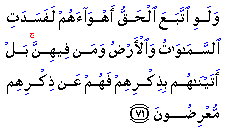Impartiality of Truth, Social Relations, Determination
Issue 492 » August 29, 2008 - Shaban 27, 1429
Living The Quran
Al-Muminun (The Believers)
Chapter 23: Verse 71
 Impartiality of Truth
Impartiality of Truth
"If the Truth had been in accord with their desires, truly the heavens and the earth, and all beings therein would have been in confusion and corruption! Nay, We have sent them their admonition, but they turn away from their admonition."
Islamic thought, with its approaches and concepts springing from belief in Allah and His oneness, includes a very basic assumption in the way it looks into any field of knowledge. This general and basic assumption is that truth and reality, right and wrong, and good and evil are in fact neutral realities which must be understood in the light of both the nature which Allah has created in humankind and the revelations which He has sent to guide them. From this standpoint, the Muslim mind is a scientific one which seeks knowledge on its own terms and according to its own objective rules, rather than on the basis of whim or presupposed notions. For this reason the efforts of the Muslim mind will not be wasted and will not go astray.
The objectivity of truth and reality is a living and dynamic concept in which relations are regulated by the fitrah, the natural laws of the universe, and values that distinguish between right and wrong. This concept is one that ignores the sophistry of diseased minds that cry out in the name of knowledge and free inquiry, and then attempt to belittle society's most basic standards of decency. Such minds do not balk at defending even the most disgusting perversions, and presenting them in such a way that they appear to be the rule rather than the exception. Such thought and blind methodology will never result in anything other than perversion, corruption, and deviation that further tear the fabric of society and destroy its family structure.
Source:
"Crisis In The Muslim Mind" - AbdulHamid A. AbuSulayman
Understanding The Prophet's Life
Social Relations
Islam gives great importance on social relations. The peace and stability of society depends on good social relations amongst the members of society. As such Islam has laid down detail instructions so that, social relations are properly maintained and not disrupted by wrong practices. The importance of social relations will be clear from the following saying of the Prophet Muhammad (peace be upon him).
"Do not be envious of each other, nor backbite nor hate one another, but become brothers in the service of Allah." (reported in Bukhari, the book of tradition of the Prophet)
Islam has, therefore, made it unlawful for a Muslim to cut relations with fellow Muslims. The Prophet of Islam has said, "One who cuts relations will not enter paradise." (reported by Bukhari)
The Prophet of Islam has also said,
"It is not permissible for a Muslim to keep apart from his brother for more than three days. If three days pass, he should meet him and greet him, and if he replies to it, they will both have shared in the reward, while if he does not reply, he will bear his sin while the Muslim (who offered him the greeting) will have been freed from the sin of keeping apart." (reported by Abu Daud, a book of tradition of the Prophet)
Islam has also emphasised the need for immediate settlement of social disputes so that, peace in general prevails in the society.
The Prophet of Islam has said, "Shall I not inform you of something more excellent in degree than fasting, charity and prayer?" On receiving the reply, 'Certainly', he said, "It is putting things right between people." (reported by Al-Tirmidhi and others)
Source:
"Social Laws in Islam" - Shah Abdul Hannan
Blindspot!
Determination
Islam has declared achievement of strength and power essential. Its one characteristic and manifestation is that you make a firm determination and a strong resolve to achieve, with the help of your nearest available means and resources, your objective. Try your utmost in achieving your goal. You should leave no stone unturned and no room for chance, and thereafter leave the outcome in the hands of destiny. There are many individuals who take Allah's shelter in order to cover their objectionable defects reprehensible negligence, inability and laziness, and grumble against luck. Islam has disapproved of this tendency.
It is the duty of everybody that he should make full efforts and try to the best of his ability to overcome his difficulty, till the time he achieves his objective. If he overcomes his difficulties then he has fulfilled his responsibility.
However, if after making all the efforts he fails, then at such a time the support of Allah is the best shelter for him, which would help him to overcome the sense of defeatism and frustration. In both the states he is strong and powerful. First by making efforts and working and in the second case by relying on God he receives strength.
Islam does not like that in your affairs you should be a prey to vagueness and hesitation. You should not be undecided in the matter of selecting the advantageous alternative. Your head should not be filled up with doubts and misgivings, resulting in an atmosphere of uncertainty and indecision, making it difficult for you to come to a decision. It does not like that due to your weakness you may not be able to strongly hold the advantageous things in your firm grip, and they should slip through your fingers and may be wasted. This restlessness and indecision does not become a Muslim.
Source:
"Muslim's Character" - Muhammad Al-Ghazali